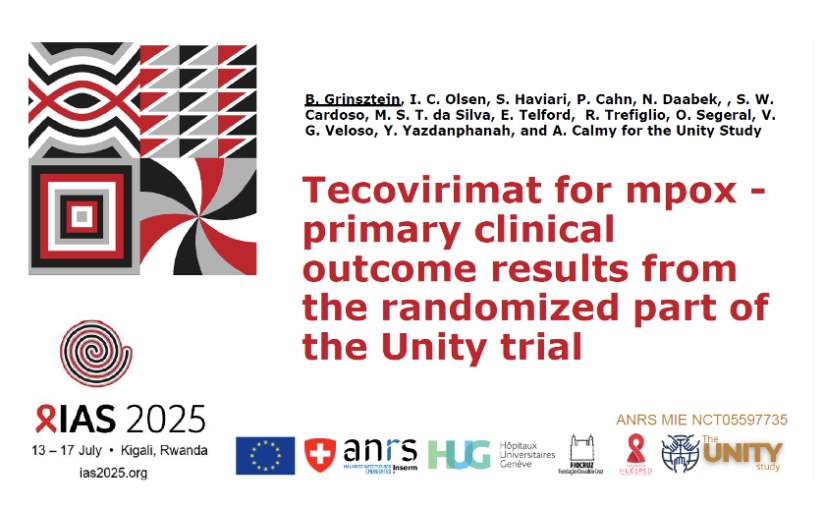Large international trial UNITY reports no clinical benefit from tecovirimat for mpox resolution

On Thursday, July 17, at the International Aids Society (IAS) 2025 conference in Kigali, Rwanda, primary results from the UNITY trial sponsored by ANRS Emerging infectious diseases (ANRS MIE) conducted in Brazil, Argentina, and Switzerland were presented1. The oral presentation was delivered by Dr. Beatriz Grinsztejn, one of the principal investigators of the study, highlighting key findings on the efficacy and safety of tecovirimat in treating mpox.
No benefice in resolving lesions with tecovirimat
As part of the MPX response project, UNITY trial is an international, phase III, double-blind, placebo-controlled trial. 480 participants were randomized across Brazil, Argentina, and Switzerland, aged 14 and older, with confirmed or suspected mpox and at least one active lesion. Participants received either tecovirimat or placebo for 14 days alongside standard care.
The primary outcome —time to full lesion resolution— showed no significant difference between the two arms. The estimated time ratio was 1.02 (p=0.73), indicating no meaningful clinical benefit for tecovirimat compared to placebo. This conclusion was confirmed regardless of the subgroup analyzed—including age, HIV status, lesion count, and symptom duration. No difference between the tecovirimat and the placebo arm were observed either when analyzing key secondary endpoints: time to active lesion resolution (13.4 days in both arms), pain, hospitalization, complications.
Safety confirmation
Despite the lack of efficacy, tecovirimat was safe and well tolerated, with a safety profile comparable to placebo. No safety signal were reported. Pain scores and hospitalization rates were similar, and no deaths occurred during the 29-day follow-up period.
In conclusion
The findings from the UNITY trial are consistent with previous studies—STOMP (focused on Clade II mpox) and PALM-007 (Clade I), —which also failed to show significant benefit with tecovirimat. Importantly, for UNITY, individuals at higher risk of severe disease were excluded from the randomized arm and were administered tecovirimat compassionately in an open-label arm of the study. Further analyses of the open-label arm, alongside sub-studies on virological resistance and pharmacokinetics, are underway to better understand the preliminary randomized-arm findings and to inform tecovirimat use in severely ill participants.
These findings occur as mpox remains a global issue and has continued to spread in Africa essentially by also beyond with regularly reported mpox cases.
With no proven antiviral treatment for mpox, the UNITY trial underscores the urgent need for effective therapeutic strategies, particularly for individuals at risk of severe disease progression.

“The UNITY findings contribute to growing body of evidence that tecovirimat is safe but not efficacious in leading to faster resolution of mpox lesions, even with higher prevalence of HIV coinfection.”
Dr. Beatriz Grinsztejn, Co-PI of UNITY trial in Brazil and Head of the Fiocruz STI/AIDS Clinical Research Laboratory and the Fiotrials Prevention and Therapeutic Clinical Trials Unit
“Early administration of tecovirimat following confirmed exposure may help limit the spread of the epidemic in specific settings and could serve as the focus of future clinical research.”
Pr. Alexandra Calmy, Co-PI of UNITY in Switzerland, Head of HIV Unit – Division of Infectious Diseases (Geneva University Hospitals)
The UNITY trial is sponsored by ANRS Emerging infectious diseases (ANRS MIE) and is part of the MPX-RESPONSE project. It has received funding from the European Union’s H2020 research and innovation funding programme under grant agreement 101115188, and SEFRI in Switzerland. The trial was conducted with the support of SIGA.
- Tecovirimat for mpox – primary clinical outcome results from the randomized part of the Unity clinical trial. Oral communication. Beatriz Grinsztejn. In the session : Making impact with mpox: Epidemiology and medical countermeasures. IAS 2025
